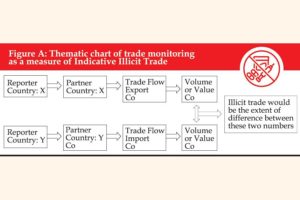Effectiveness of tobacco control initiatives is subject to the status of trade regulations of a region. As a direct effect of trade liberalisation by many countries, the world has experienced stimulation in trade volume of tobacco and tobacco products in recent years. Reduction in trade barriers might increase possibility of tobacco marketing and reduce their price causing higher consumption of tobacco. This effect of liberalisation on consumption is more prominent in low and middle income countries (LMIC) than their high-income counterparts according to researcher Taylor and Bettcher.
Similar to licit trade of tobacco validated by trade openness among countries, presence of illicit trade in the sector also enhances easy accessibility of tobacco products by undercutting tobacco prices. The extent of illicit trade, therefore, possesses a complex and pressing challenge for effective control of tobacco in any country.
Empirical estimation of the extent of illicit trade in tobacco market often remains as an intricate task because of its stealthy nature. Tobacco researchers around the world quite often triangulate several methods to improve preciseness of measurement of magnitude of illicit trade.
In 24 November 2019, reputed researcher Dr. Rumana Huque, SM Abdullah (Faculty members at Department of Economics, the University of Dhaka) and Nahian Azad Shashi (Research associate at Bangladesh Institute of Development Studies) have written an editorial about illicit trade at business daily The Financial Express (Bangladeshi national English newspaper). Where they underlined to monitor in tobacco trade to reduce Illicit tobacco trade. And they also emphasize on tracking and tracing system for proper implementation of the FCTC protocol on illicit trade. Because it would be the key to addressing the concern over illicit supply of tobacco products. They think addressing underreporting of tobacco trade might help increasing fiscal revenue and making tobacco combat successful in Bangladesh.
To read this article in brief please click the bottom link …



